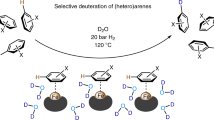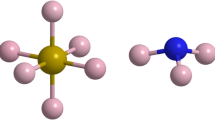Abstract
RECENT studies by Peters et al.1 have suggested that fluoroacetate poisoning is due to the formation in vivo of a fluorotricarboxylic acid which blocks the tricarboxylic acid cycle. In order to test this hypothesis, we have prepared sodium fluoroacetate labelled with carbon-14 in the methylene group.
This is a preview of subscription content, access via your institution
Access options
Subscribe to this journal
Receive 51 print issues and online access
$199.00 per year
only $3.90 per issue
Buy this article
- Purchase on Springer Link
- Instant access to full article PDF
Prices may be subject to local taxes which are calculated during checkout
Similar content being viewed by others
References
Liébecq, C., and Peters, R. A., Biochem. et Biophys. Acta., 3, 215 (1949). Buffa, P., Peters, R. A., and Wakelin, R. W., Biochem. J., 48, 467 (1951).
McCombie, H., and Saunders, B. C., Nature, 158, 382 (1946). Saunders, B. C., and Stacey, G. J., J. Chem. Soc., 1773 (1948).
Sanders, R. T., “Vacuum Manipulation of Volatile Compounds”, 90 (1948).
Author information
Authors and Affiliations
Rights and permissions
About this article
Cite this article
SAUNDERS, B., WORTHY, T. Preparation of Carbon-labelled Sodium Fluoroacetate on a Micro-scale. Nature 169, 38–39 (1952). https://doi.org/10.1038/169038a0
Issue Date:
DOI: https://doi.org/10.1038/169038a0
Comments
By submitting a comment you agree to abide by our Terms and Community Guidelines. If you find something abusive or that does not comply with our terms or guidelines please flag it as inappropriate.



